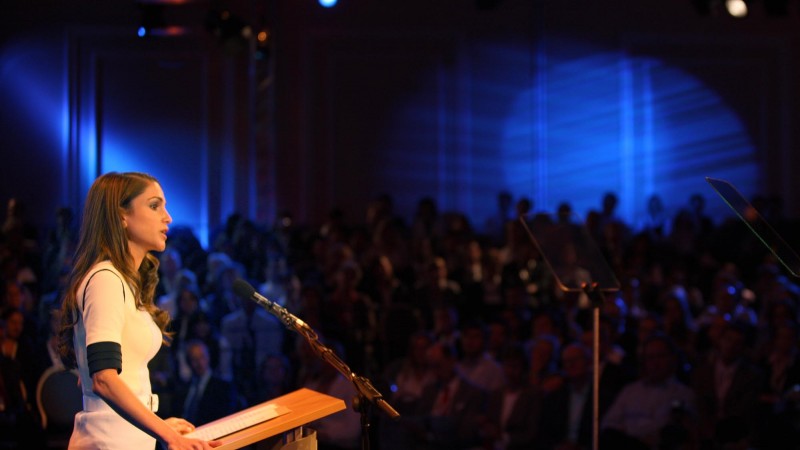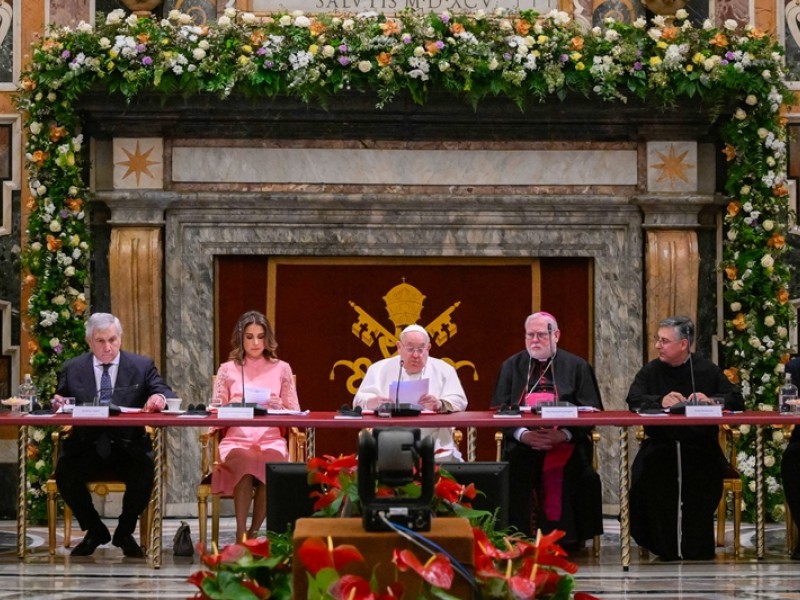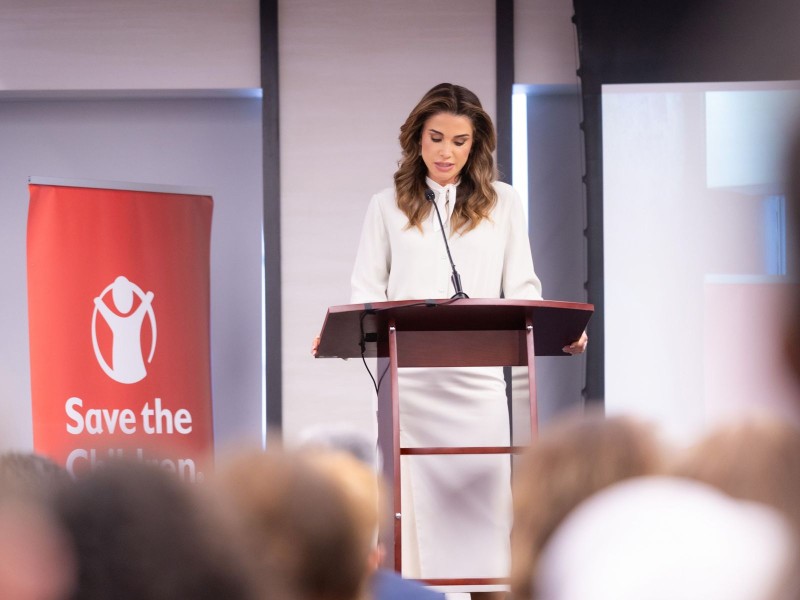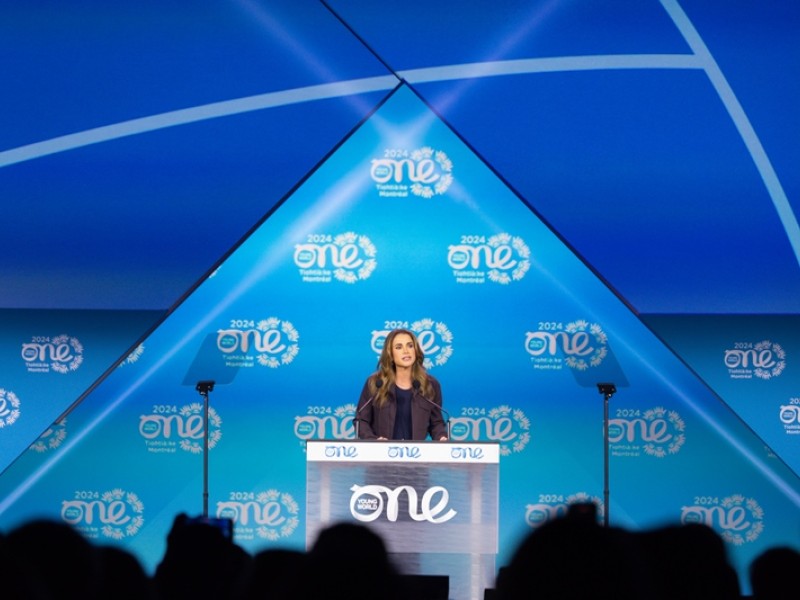Queen Rania's Speech at Global Reporting Initiative Conference 2008 - Amsterdam, Netherlands
"Over 1000 participants today. Representation of all continents. Membership of more than 1500 companies. 1750 GRI reports expected to be written this year. Endorsements from the G8 and the UN. And 80 per cent of Business Week’s top 15 global brands, all using GRI guidelines.
Hmm. It seems predictions that sustainability reporting would only ever be a niche activity have proven… unsustainable! Ernst, you must be doing something right!
Thank you for your warm words and for your work at the helm of the GRI… navigating the restless waters of non-financial reporting so wisely, calmly and confidently. Under your leadership, GRI is growing exponentially in size and stature, and fast becoming the world’s most widely-recognized reporting framework.
And let me say, also, what a pleasure it is to be back in Amsterdam…a city full of history… architectural wonders…and where the walkways and waterways echo with the legacies of Holland’s proud sons and daughters.
One of her most famous sons, Vincent van Gogh, once said that “Conscience is a man’s compass.” (And although I don’t believe he was talking exclusively about sustainability reporting, I think his advice still rings true for us today!)
It seems to me that we’re all gathered here because we’ve been guided by our common conscience.
Each one of us aware of the yawning inequities globalization has dealt …each one of us aware of the fragility of our environment…each one of us aware that no single sector can overcome these challenges … each one of us aware that we have a duty to reach out and raise up as many people as we can.
Yes, as leaders of business, government, NGOs, and civil society, there are many woes weighing on our minds… many responsibilities resting on our shoulders…and many eyes eagerly anticipating our next move.
The annual Edelman Trust Barometer suggests the majority of global opinion leaders believe that business plays a role that no other institution can in addressing social and environmental challenges…that’s everything from preventing polar icecaps from melting, and sea levels from rising; to providing opportunities for the ‘bottom billion’ people in the world. All while generating profit and giving power-point presentations!
And yet, less than half of those global opinion leaders trust companies to do “what’s right”…to realize their responsibilities…and move from promise to performance.
One surefire way to prove that business is serious about doing “what’s right” is to publish a sustainability report. It shows the global community we’re serious about what we say we’ll do...that we’ll keep our commitments…and hold ourselves to a higher standard.
And, for companies that want to remain competitive, they’re crucial.
In a world increasingly dominated by rankings and ratings, writing these reports has never been so critical. Reading them has never been so revealing.
And they are read. Not just by shareholders and staff, but by an ever expanding army of NGOs and newspaper journalists ready to delve deep into the details, check rhetoric against reality, and share their thoughts at internet speed.
I know that everyone here is grateful to the GRI for their finely tuned set of rules and tools which take the pain out of the writing and reading process. The technically strong, trusted, and user-friendly G3 guidelines are just the latest tool to make reporting easier for us all.
And that’s important because in the post-Enron era, reporting, transparency, and accountability are signature issues. They illustrate integrity. They build trust.
Most importantly, they enhance a company’s brand, reputation, and product differentiation giving them an enviable edge over companies who don’t report. And the international market is catching on too, by rewarding companies who report on the impact of their operations.
It seems that being a company with a conscience is cool.
And this is backed up by the same Edelman survey I mentioned earlier. Participants were asked, “When you consider a company socially responsible, what are you most likely to do?” The number one answer was “buy their products”; the number two answer was “recommend them”; and the number three answer was “invest” in them. I don’t need to tell you that what all these answers have in common is the promise of profit and share value.
Proof that you can do well, while you do good.
It is for all these reasons that 16 dynamic Arab business men and women set their compasses West this week to join the GRI. That’s an 8 fold increase since 2006, which is very encouraging. You might need a bigger hall for us all next time!
In our part of the world, sustainability is more than a concept, but it’s not yet a culture. We still have a long way to go before embedding it in our companies’ DNA. I hope that we can rely on all of you here to help us do that.
But there are some encouraging signs that reporting is beginning to take root in our region’s business landscape.
In Jordan, for example, Aramex was the first company to issue a GRI checked report…covering everything from staff training and salaries to promoting road safety and reducing poverty. And soon, Abraaj will be the first private equity firm to release one in Dubai.
I’m especially proud, too, that the Jordan River Foundation, a social development organization that I chair, recently became the first NGO in the region to produce a GRI checked report…because NGOs that can show they’re accountable and transparent are more attractive to donors, and are more viable partners for corporations and government.
And they’re not alone. Sustainability and reporting are beginning to resonate with other leading businesses in the region: from NCB in Saudi Arabia, and the Sekem Group in Egypt to Paltel in Palestine.
And we’re also seeing innovation in some unexpected fields. Mubadala in Abu Dhabi is investing its oil and gas wealth in projects to explore energies of the future. They are creating a city that will have zero emissions, and partnering with MIT to build a university dedicated to developing renewable fuels.
I want to thank all representatives of the Arab business community, NGOs and government leaders for coming here today…showing their commitment to sustainability…looking for opportunities to learn…and boldly breaking new paths for our region.
But we know that if we want to compete internationally, we’ve got some catching up to do.
We have to multiply our efforts… open up…work together…look beyond our borders…be more transparent…increase public awareness of climate concerns…activate our civil society…spotlight the social good our companies are doing… cut our carbon footprints…and improve our corporate reputations.
And we will. One step at a time.
Today, I am pleased to announce a new network of Arab companies dedicated to sustainability and reporting.
The Arab Sustainability Leadership Group (ASLG) will scale up efforts throughout our region… by liaising with business leaders…offering support…sharing ideas…and showcasing successes.
It will be the region’s voice on the global stage, ensuring that the Arab world not only catches up, but keeps pace with the front runners in this field.
And it doesn’t stop there. We’re also working with AccountAbility to produce a Responsible Competitiveness Index for our region. We know that a country with sound labor standards delivers more competitive industries…and that increased energy efficiency can open doors to higher value markets.
And as we engage our civil society and educate our business leaders about how economic vitality, ecological integrity, and social equity complement each other, I’ll be particularly spotlighting the issue of social equity…
Until recently, corporate sustainability was, to a large extent, synonymous with environmental protection.
And let me state quite clearly: there is no doubt that shielding our environment is critical, is integral to social equity, and must remain high on the agenda …but in the Arab world, we desperately need to focus our energies on creating equal opportunity for all, particularly our young people… our potential...our future.
60% of our region is under the age of 30…that’s 70 million young people in the Arab world. They need our help, your help, in order to become all they can be.
Because at the moment 6 million of our children are not enrolled in school; over half of them are girls.
At the moment, 9.2 million of our young people are illiterate; they cannot read your advertisements or fill in your job application forms.
At the moment, almost 1 in 5 of our population lives below the national poverty lines: children are out laboring, instead of learning…just to make ends meet.
And we have the world's highest rate of youth unemployment; only one in three young people has a job.
Ladies and gentlemen, this too, is an inconvenient truth!
And it is not the kind of future I want for the young people of the Arab world.
We must put the boys and girls and young people of my region at the top of our boardroom agendas. Because a world where so many youth are hungering for opportunity is not a sustainable world.
We know what needs to be done.
Some interventions are simple and low cost … initiatives to get our girls learning in schools… sponsoring reading programs in local communities… offering internships for promising young graduates.
These are the kind of investments where a little goes a long way.
Some interventions are at a slightly larger level. Last month, for example, I launched a new initiative called Madrasati –My School, in English. Madrasati’s all about encouraging the private sector in Jordan, and across the Arab world, to adopt 500 rundown public schools and work with communities of volunteers to refurbish classrooms, playgrounds, and sports facilities so that our children can learn in safe, warm, well-equipped surroundings. I am pleased to say that contracts of commitment are rolling in and that the work of building and brightening is about to begin.
But we need bigger interventions too. We need a vibrant and rapidly expanding labor market to provide jobs. We need to create 5 million new jobs, every year just to prevent a rise in unemployment … that’s one job almost every ten minutes.
So, when you turn the page to the Social Equity chapter of your sustainability report, please pause and think of the young people many miles away in the Middle East who are looking to you for moral leadership…and a shot at the future.
For them, it’s what you do after you write the report that matters.
So, if our conscience is our compass, let global compassion be our guide.
Thank you very much."
Featured
Queen Rania's official website
This website does not support old browsers. To view this website, Please upgrade your browser to IE 9 or greater
Your browser is out of date. It has known security flaws and may not display all features of this and other websites. Learn how to update your browser




